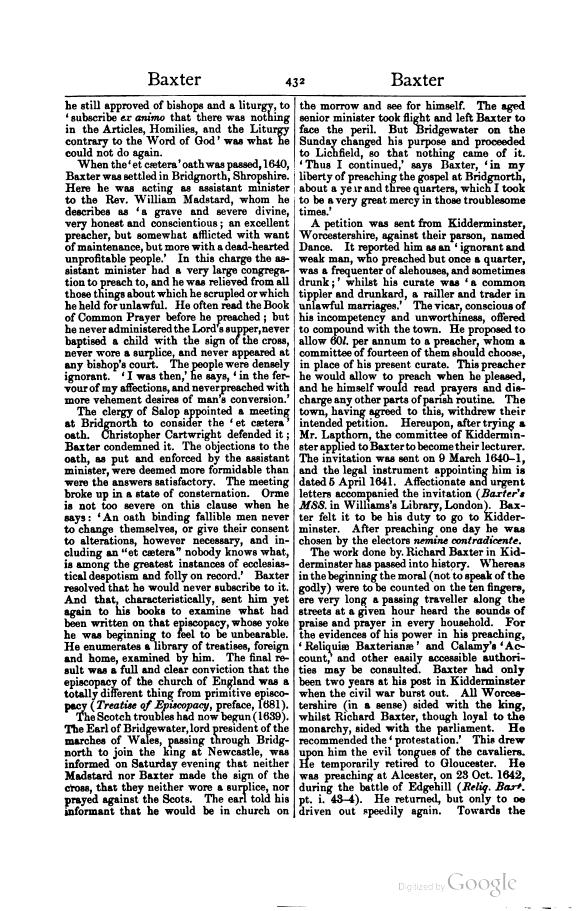he still approved of bishops and a liturgy, to 'subscribe ex animo that there was nothing in the Articles, Homilies, and the Liturgy contrary to the Word of God' was what he could not do again.
When the 'et cætera' oath was passed, 1640, Baxter was settled in Bridgnorth, Shropshire. Here he was acting as assistant minister to the Rev. William Madstard, whom he describes as 'a grave and severe divine, very honest and conscientious; an excellent preacher, but somewhat afficted with want of maintenance, but more with a dead-hearted unprofitable people.' In this charge the assistant minister had a very large congregation to preach to, and he was relieved from all those things about which he scrupled or which he held for unlawful. He often read the Book of Common Prayer before he preached; but he never administered the Lord's supper, never baptised a child with the sign of the cross, never wore a surplice, and never appeared at any bishop's court. The people were densely ignorant. 'I was then,' he says, 'in the fervour of my affections, and never preached with more vehement desires of man's conversion.'
The clergy of Salop appointed a meeting at Bridgnorth to consider the 'et cætera' oath. Christopher Cartwright defended it; Baxter condemned it. The objections to the oath, as put and enforced by the assistant minister, were deemed more formidable than were the answers satisfactory. The meeting broke up in a state of consternation. Orme is not too severe on this clause when he says: 'An oath binding fallible men never to change themselves, or give their consent to alterations, however necessary, and including an "et cætera" nobody knows what, is among the greatest instances of ecclesiastical despotism and folly on record.' Baxter resolved that he would never subscribe to it. And that, characteristically, sent him yet again to his books to examine what had been written on that episcopacy, whose yoke he was beginning to feel to be unbearable. He enumerates a library of treatises, foreign and home, examined by him. The final result was a full and clear conviction that the episcopacy of the church of England was a totally different thing from primitive episcopacy (Treatise of Episcopacy, preface, 1681).
The Scotch troubles had now begun (1639). The Earl of Bridgewater, lord president of the marches of Wales, passing through Bridgnorth to join the king at Newcastle, was informed on Saturday evening that neither Madstard nor Baxter made the sign of the cross, that they neither wore a surplice, nor prayed against the Scots. The earl told his informant that he would be in church on the morrow and see for himself. The aged senior minister took flight and left Baxter to face the peril. But Bridgewater on the Sunday changed his purpose and proceeded to Lichfield, so that nothing came of it. 'Thus I continued,' says Baxter, 'in my liberty of preaching the gospel at Bridgnorth, about a year and three quarters, which I took to be a very great mercy in those troublesome times.'
A petition was sent from Kidderminster, Worcestershire, against their parson, named Dance. It reported him as an 'ignorant and weak man, who preached but once a quarter, was a frequenter of alehouses, and sometimes drunk;' whilst his curate was 'a common tippler and drunkard, a railler and trader in unlawful marriages.' The vicar, conscious of his incompetency and unworthiness, offered to compound with the town. He proposed to allow 60l. per annum to a preacher, whom a committee of fourteen of them should choose, in place of his present curate. This preacher he would allow to preach when he pleased, and he himself would read prayers and discharge any other parts of parish routine. The town, having agreed to this, withdrew their intended petition. Hereupon, after trying a Mr. Lapthorn, the committee of Kidderminster applied to Baxter to become their lecturer. The invitation was sent on 9 March 1640-1, and the legal instrument appointing him is dated 5 April 1641. Affectionate and urgent letters accompanied the invitation (Baxter's MSS. in Williams's Library, London). Baxter felt it to be his duty to go to Kidderminster. After preaching one day he was chosen by the electors nemine contradicente.
The work done by Richard Baxter in Kidderminster has passed into history. Whereas in the beginning the moral (not to speak of the godly) were to be counted on the ten fingers, ere very long a passing traveller along the streets at a given hour heard the sounds of praise and prayer in every household. For the evidences of his power in his preaching, 'Reliquiæ Baxterianæ' and Calamy's 'Account,' and other easily accessible authorities may be consulted. Baxter had only been two years at his post in Kidderminster when the civil war burst out. All Worcestershire (in a sense) sided with the king, whilst Richard Baxter, though loyal to the monarchy, sided with the parliament. He recommended the 'protestation.' This drew upon him the evil tongues of the cavaliers. He temporarily retired to Gloucester. He was preaching at Alcester, on 23 Oct. 1642, during the battle of Edgehill (Reliq. Baxt. pt. i. 43-4). He returned, but only to be driven out speedily again. Towards the
